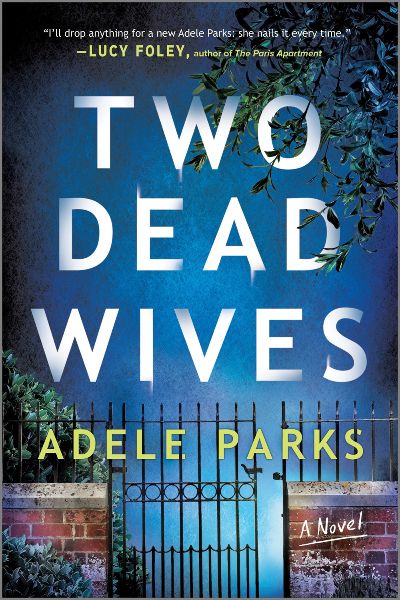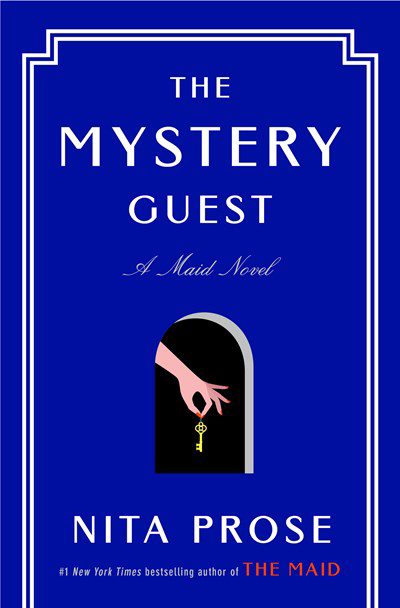This sequel to Woman Last Seen (2022) publishes the day after Christmas, but it’s far from your traditional holiday read. It does, however, provide more than ample entertainment for days off and/or fuel for thinking away interminable events. The main thought provoker is: how does a woman manage to be married with kids in one family while also married to someone else? How are the two husbands and the kids supposed to feel now that Kylie, also known as Kai and Leigh, the bigamist whom they thought they hated, has gone missing? And what’s the second husband to do, accused as he is of Leigh’s murder, when he knows he didn’t do it and nobody even knows if she’s actually dead? Leave this one up to the kids, who are sick of the media firestorm around them, not to mention tired of their mother’s best friend who has moved in just a little too quickly and whom they know visits Dad’s room at night. Philosophical questions quickly give way to a thrilling investigation and final pages that will keep readers on edge and rooting for justice.
Domestic
This is one wild, suspense-driven tale, equally rich in characterization and plot. Breanna is on a mini-vacation with her new boyfriend, Ty, staying in a beautiful brownstone in Jersey City while touring Manhattan. Ty’s thought of everything, and the long weekend is 95 percent perfect, except for that five percent when Ty won’t stop with the work calls. But when Bree wakes up on their final morning, she can’t find Ty anywhere. What she does discover, strewn in the foyer, is the bloody corpse of a young woman that turns out to be Janelle, who has been missing for days. From here, things really take off, with Bree’s best friend—they’ve been estranged since college—arriving on the scene (she’s a take-charge criminal attorney), while Billie, a super-successful makeup influencer, rallies her thousands of followers into seeking #Justice4Janelle. Garrett does a great job of tracking the racism Bree experiences, from the neighbors’ microaggressions to the stereotypes purported about Ty to the national frenzy that only a white woman’s disappearance could generate (and thus the book’s title). A great cast, a wide-reaching narrative, and a resolution that will leave readers ruminating for days. Can’t wait to introduce this to a book group
Actor and now debut novelist Lindstrom explores the dark side of life in Los Angeles. Winston Greene used to be one of the top actors in the world, but his prestige is gone, along with most gigs. His six-year-old granddaughter arrives in the middle of the night after getting a ride from a stranger; she appears out of sorts, and she’s carrying a stuffed puppy and a thumb drive. The drive contains a ransom video featuring Winston’s daughter, who will die unless he gives her kidnappers all the money from his prestigious career. Going to the police will only put a target on Winston and his granddaughter’s backs. Thankfully, he has some friends who can help, including a former LAPD detective and a stuntman. These characters are all flawed, but that makes the story more engaging than if they were squeaky-clean superheroes. Lindstrom uses his knowledge of Hollywood to deliver a clever and gripping thriller, and he writes like a pro. It is hard to believe this is a debut.
Everything is creepy about the Windermere, a ritzy, historic New York City apartment building with Rosemary‘s Baby vibes to spare. But at first, Rosie, an author; and Chad, her husband and an aspiring actor, hardly notice. They’re too busy taking care of one of the residents, Chad’s uncle, who has died as the book opens, and who leaves the apartment to the broke young couple—and not his own daughter. Why? And while the residents couldn’t be more welcoming, Rosie—who’s writing a book about the history of the Windermere, focusing especially on the many murders—can’t contain her suspicions. What’s up with the doorman, who seemingly works around the clock? And the child she would swear she saw crouching in the basement? Why are there cameras absolutely everywhere? And, most importantly, why is Chad acting so weird, disappearing for huge stretches of time? Unger’s novels are textbook examples of perfect suspense fiction, and this title is no different. As we race through the narrative, we watch in terror as “something dark is on the horizon” becomes something dark that is right next to you. And we are helpless to stop it. Love New York? Then this super accurate portrayal of the City is doubly fun.
WHAT a rollercoaster. The “darling girls” in question–Jessica, Norah, and Alicia–are “foster children,” stuck being referred to that way even now that they’re adults. They aren’t biological sisters, but the mistreatment meted out at Wild Meadows by their foster mother, the psychologically cruel and unpredictable Miss Fairchild, has forced them into a lifelong bond. These days, Jessica is a housecleaner who steals her clients’ prescriptions and is being pursued by the relentless Debbie Montgomery-Squires, who wants her Valium back. Norah is on probation for her latest attack, one in a long string of anger-fueled outbursts. And Alicia is barely holding it together as a social worker who’s terrified to pursue a relationship with a female friend who could be more. The three are thrust back into their awful past when the police call to say that a body has been found buried at Wild Meadows, one that appears old enough to have been from their time at the “home.” What ensues are flashbacks to the children’s bizarre, cliff-edge lives as wards of a tyrant, while the darkly funny present-day tale looks at women who fight the system and their circumstances tooth and nail to avoid being victimized again. This is the rare story that’s equally character and plot driven, with the “sisters” portrayed as distinct and lovable and the plot just packed with twists. Hating Miss Fairchild is the icing on the cake
Millions of fans of Molly—“the maid”—Gray will be delighted with this wonderful second installation, which features returning characters (such as Mr. Preston, the congenial doorman, and Detective Stark, the grouchy cop) along with a handful of new characters. But most important is J.D. Grimthorpe, renowned mystery author, who chooses Molly’s five-star Regency Grand Hotel to make a most important announcement. No sooner does he mount the stage in the perfectly appointed tea room (expect nothing less from Molly, the head maid) than he suddenly drops dead. Very, very dead. And not from a medical condition. J.D. Grimthorpe was murdered. The path to finding the murderer is a long and twisted one, taking Molly back into her childhood and her early days working alongside her beloved Gran. But as guests and employees start looking at each other with accusation in their eyes, the pressure for Molly to solve the case mounts. In the first volume, The Maid, there was much discussion about Molly being autistic or otherwise neurodivergent. Not qualified to make such an assessment myself, I prefer to think of Molly as eccentric. As this tale draws to a close, several secrets are most satisfyingly revealed, and one major opportunity presents itself, which will leave me in a state of wonder until the next Molly mystery. Pronto, please.
A superb novel of suspense that alternates between the terrifying present and the complex past that led up to this moment. A woman, sleeping near her two young children in a Colonial home in Massachusetts town, hears what she thinks are footsteps. Could there be anything scarier? Except this is an old house, always creaking. Perhaps it’s her imagination. Then, thanks to the nightlight, she sees a man, a huge man, slowly climbing the stairs, as “his fingers wrap the banister like white spider legs.” What should she do? A blizzard rages outside, making escape impossible. Then she remembers that the house has a tiny, hidden room, and she hustles the children and herself into it, while still worrying how they will be able to survive. Sierra keeps the adrenaline pumping, but takes breaks from the primary narrative to explore the woman’s life, from a less than happy marriage to an abusive relationship with her father-in-law to a patriarchal society that refuses to believe her. This unique, thinking-person’s thriller would be great for a book discussion, there’s so much here to unpack.
Kudos to Edwin Hill for a book so sophisticated, suspenseful, and shocking. It’s set in Monreith, a small, coastal suburb south of Boston where everyone knows, and oftentimes loathes, everyone else. It’s also where restaurateur Laurel Thibodeau is brutally murdered and her husband—it’s always the spouse, right?—is the prime suspect. Especially when his massive gambling debts, the type that need an insurance policy to offset, become public. But while Laurel’s murder sets things in motion, the novel is really centered on six friends whose lives are intertwined in the most disturbing of ways. This includes super-wealthy shrink Farley Drake, who loves to blur the friend/client line. Georgia Fitzhugh, a Unitarian minister, also privy to many personal lives, and whose husband, Ritchie, has moved out and is now living with Farley. And Max Barbosa, the handsome chief of police, Ritchie’s childhood best friend, who leaks information like the proverbial sieve while lusting after Georgia. And that’s just for starters! The novel takes place in one late summer day, culminating in a birthday dinner for one of the six that yields yet more tragedy. Hill takes some big risks here—he moves the narration among the group, playing with time as well—and we often get to see the same scene from different points of view. But what could have been a bore works wonderfully, thanks to the tightness of the prose, the tension of the story, and the credibility of the characters. Mute that cell phone and curl up for several hours of great suspenseful reading.
O’Connor’s second tale starring rural Irish veterinarian Dimpna Wilde at first has all the markings of a cozy. A female protagonist whose job is a magnet for drama, animals—including a talking African grey parrot called Bette Davis,who plays a major role in the story—and a love interest who’s in law enforcement. But cozies usually involve a sanitized crime, and this is where O’Connor takes a decided swerve out of the gentle side of the genre. The murder mystery that Dimpna finds herself enmeshed in is the killing of a young woman, Brigid, who early in the story shows up at the vet clinic with an injured animal. It’s a hare that has a cut on its leg from someone, Brigid says, trying to remove its foot. The gruesome motif is repeated when Dimpna finds Brigid tied to a tree, dead and with her hand cut off. At the same time, chalked graffiti around the town asks, “Who put Bella in the witch elm?”, just one of the intertwined puzzles facing Dimpna and the man she’s falling for, Inspector Cormac O’Brien, as they investigate the town’s many intriguing residents and visitors. While this absorbing story stands well on its own, you’ll want to go back to the first in the series, No Strangers Here, to spend more time with this smart, kind vet and her knack for attracting trouble.
Sometimes it’s the setting that grabs you. Often it’s the plot. But here it is two fabulous characters who come together and through sharp dialogue create a story that both cozy and traditional-mystery readers will love. Former Senator Dorothy Gibson—pant-suit loving, wise-cracking, and wine-imbibing—has just weeks ago lost a run for the presidency to that man, and she’s retired to her northern White House on the Maine coast to lick her wounds and begin work on her memoirs. Her ghostwriter, new on the job, is summoned to Maine; Dorothy’s not one to sit idle. It’s quite a fun hothouse with Dorothy’s gay son hanging around, a ten-out-of-ten bodyguard lurking in the corridor, a Huma Abedin clone who tries to keep everyone on track—and the ghostwriter describing it all in delicious detail. All’s well until there’s a death at a neighboring estate and Dorothy and the ghostwriter, refusing to believe it’s an accident, quickly launch their own investigation. The denouement is quite wordy, but full of the requisite number of surprises. The idea of a ghostwriter as the narrator, who pairs up with different celebrities to solve crimes, is a darn good one.










